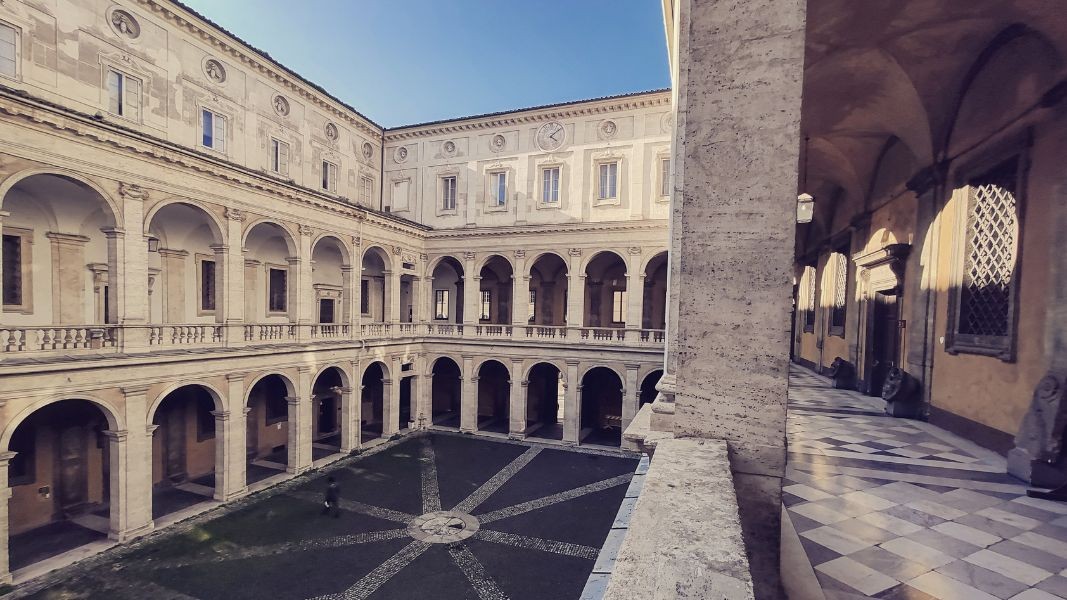"La Sapienza" in Rome is one of the oldest and most prestigious Italian universities, founded in 1303. Today it is the largest university in Europe by the number of full-time students. Similar to other higher education institutions in Italy, the Bulgarian language is taught in it. At the moment, the Bulgarian lectureship belongs to one large department "European, American and intercultural studies", and is in the collegium "South Slavic languages", together with Serbian and Croatian, we learn from Assoc. Prof. Natalia Nyagolova, lecturer in Bulgarian and culture at La Sapienza.
"I had a doctoral student who happened to come across some archaeological excavations near Shumen and she liked Bulgaria so much that she started learning Bulgarian", says Assoc. Prof. Nyagolova. "At the moment I have a student who is a descendant of Bessarabian Bulgarians and that's how she became a member of our group. But as a whole, Italians have a great potential to learn Bulgarian. After all, our language is analytical, as is Italian."

Apart from La Sapienza, Bulgarian language and literature are taught at the universities of Naples, Venice, Bologna, Bari, Trieste. The beginning was made already in 1929 by the Italian Slavist and Bulgarian studies scholar Enrico Damiani, who created the department of Slavic literature at La Sapienza and in 1942 he also founded the department of Bulgarian language at the University of Naples. Enrico Damiani was the scholar who laid the foundations of the Italian department at Sofia University in 1942. Scholars such as Riccardo Piccio (1923-2011), as well as prominent contemporary Italian Slavists Sante Graciotti, Giuseppe Dell'Agata, Mario Capaldo, Marcello Gardzaniti, contributed to the popularization of the Bulgarian language and culture in Italy.
"Italians have a very strong Paleo-Slavic school. But this thing has died out, although there are still these connections, these specialists, but it cannot be said that there is a mass interest in Paleo-Slavic studies among young people here", says Assoc. Prof. Nyagolova. "On the other hand, unfortunately, many students do not have information about Bulgaria, about our culture and our language. Because the Bulgarian language is specific in the Slavic family. I think that work should be done in the direction of providing more translations of Bulgarian literature and films in Italy. The Bulgarian Cultural Institute in Rome is doing a lot in this regard, the Bulgarian colleagues in Italy are doing the same, but it is not enough. Perhaps more ways should be devised for Bulgarian literature to reach the Italians, and not only the modern one. We have white spots around our classical literature, as well as outdated translations that need to be updated. This is a very important channel through which our culture can be popularized in Italy," concludes Assoc. Prof. Nyagolova.

Video: Veneta Nikolova
Photos: Veneta Nikolova, Elena Karkalanova
Canadian writer of Egyptian origin Eric Chacour is a quest of Radio Bulgaria during his visit to Sofia as one of the visiting speakers during the Month of Francophonie organized by the French Institute in Bulgaria . His award-winning debut novel Ce..
The upcoming exhibition of Bulgarian artist George Papazoff in Zagreb on 5 May 2025 was the focus of a meeting at the Bulgarian Embassy in the Croatian capital. The discussion brought together Diana Glasnova, Secretary General of the..
The Sofia Opera has been invited to open the opera season in Salerno, Italy on April 11 and 13 with a performance of the second part of Richard Wagner's tetralogy Der Ring des Nibelungen (The Ring of the Nibelung) - Die Walkure (The Valkyrie). This..
Canadian writer of Egyptian origin Eric Chacour is a quest of Radio Bulgaria during his visit to Sofia as one of the visiting speakers during the Month..
The upcoming exhibition of Bulgarian artist George Papazoff in Zagreb on 5 May 2025 was the focus of a meeting at the Bulgarian Embassy in the Croatian..

+359 2 9336 661
